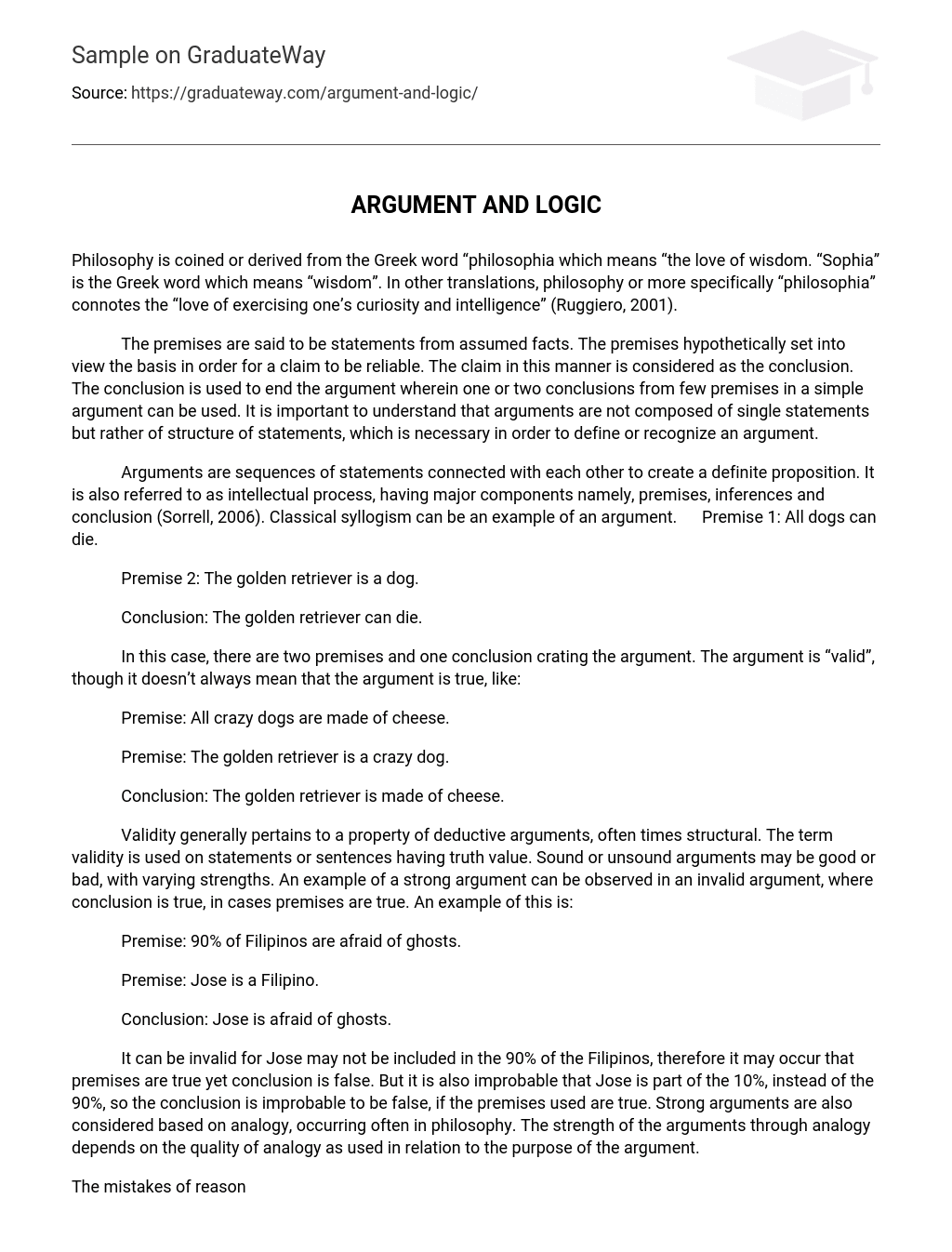Philosophy is coined or derived from the Greek word “philosophia which means “the love of wisdom. “Sophia” is the Greek word which means “wisdom”. In other translations, philosophy or more specifically “philosophia” connotes the “love of exercising one’s curiosity and intelligence” (Ruggiero, 2001).
The premises are said to be statements from assumed facts. The premises hypothetically set into view the basis in order for a claim to be reliable. The claim in this manner is considered as the conclusion. The conclusion is used to end the argument wherein one or two conclusions from few premises in a simple argument can be used. It is important to understand that arguments are not composed of single statements but rather of structure of statements, which is necessary in order to define or recognize an argument.
Arguments are sequences of statements connected with each other to create a definite proposition. It is also referred to as intellectual process, having major components namely, premises, inferences and conclusion (Sorrell, 2006). Classical syllogism can be an example of an argument. Premise 1: All dogs can die.
Premise 2: The golden retriever is a dog.
Conclusion: The golden retriever can die.
In this case, there are two premises and one conclusion crating the argument. The argument is “valid”, though it doesn’t always mean that the argument is true, like:
Premise: All crazy dogs are made of cheese.
Premise: The golden retriever is a crazy dog.
Conclusion: The golden retriever is made of cheese.
Validity generally pertains to a property of deductive arguments, often times structural. The term validity is used on statements or sentences having truth value. Sound or unsound arguments may be good or bad, with varying strengths. An example of a strong argument can be observed in an invalid argument, where conclusion is true, in cases premises are true. An example of this is:
Premise: 90% of Filipinos are afraid of ghosts.
Premise: Jose is a Filipino.
Conclusion: Jose is afraid of ghosts.
It can be invalid for Jose may not be included in the 90% of the Filipinos, therefore it may occur that premises are true yet conclusion is false. But it is also improbable that Jose is part of the 10%, instead of the 90%, so the conclusion is improbable to be false, if the premises used are true. Strong arguments are also considered based on analogy, occurring often in philosophy. The strength of the arguments through analogy depends on the quality of analogy as used in relation to the purpose of the argument.
The mistakes of reasoning are called the fallacies. This is different from mistakes of factual nature which are committed. “Hasty generalization” refers to practice of using bold conclusions based from insufficient sample of evidence. “Invincible ignorance” occurs when one does not take no for an answer even if there are provided facts that disagree his claim. “Appeal to authority”, also called the “argumentum ad verecundiam” is a fallacy wherein one is dependent on authority who is not an expert in the subject matter. Reference to the authority hides the fact that experts can be on bad terms behind on the subject. “Arguing from “is” to “ought” is a fallacy where one disagree using premises which has descriptive terms and creates conclusion that includes the statement “ought.” “What is” may not always synonymous to “what ought to be”. Argumentum ad ignorantiam or “arguing from ignorance” is when something is considered false because it is not known to be true. Also,it is a fallacy when it is argued as true because there were insufficient evidences to prove that it is false.
Furthermore, the “causality fallacy” refers to an event or situation which is followed by another event or situation, then it is instantly concluded that Event Y caused Event X. “Argumentum ad populum” is when arguments acts to popular passion, though it has nothing to do with the validity of a statement rather it is based on its truth credentials. “Circular reasoning” is when two conclusions rely upon each other to stand valid. It occurs during instances when number of alternatives declared is less than the actual amount. Lastly, “fallacies of interrogation” is when two or more questions are asked requiring only answer, though it is answerable separately. In other cases, it also occurs when the answers to the questions raised are required to acknowledge the assumption, even if the answerer would discretely deny (Lau and Chan, 2004).
References:
Lau, J., & Chan, J. (2004). Fallacies and Biases. Retrieved September 12, 2007, from http://philosophy.hku.hk/think/fallacy/fallacy.php
Ruggiero, T. (2001, September 2007). What is Philosophy. Retrieved September 12, 2007, from http://www.philosophicalsociety.com/What%20Philosophy%20Is.htm
Sorrell. (2006). Arguments: What is an Argument? Retrieved September 12, 2007, from http://www.thebluesmokeband.com/argument.1.php





